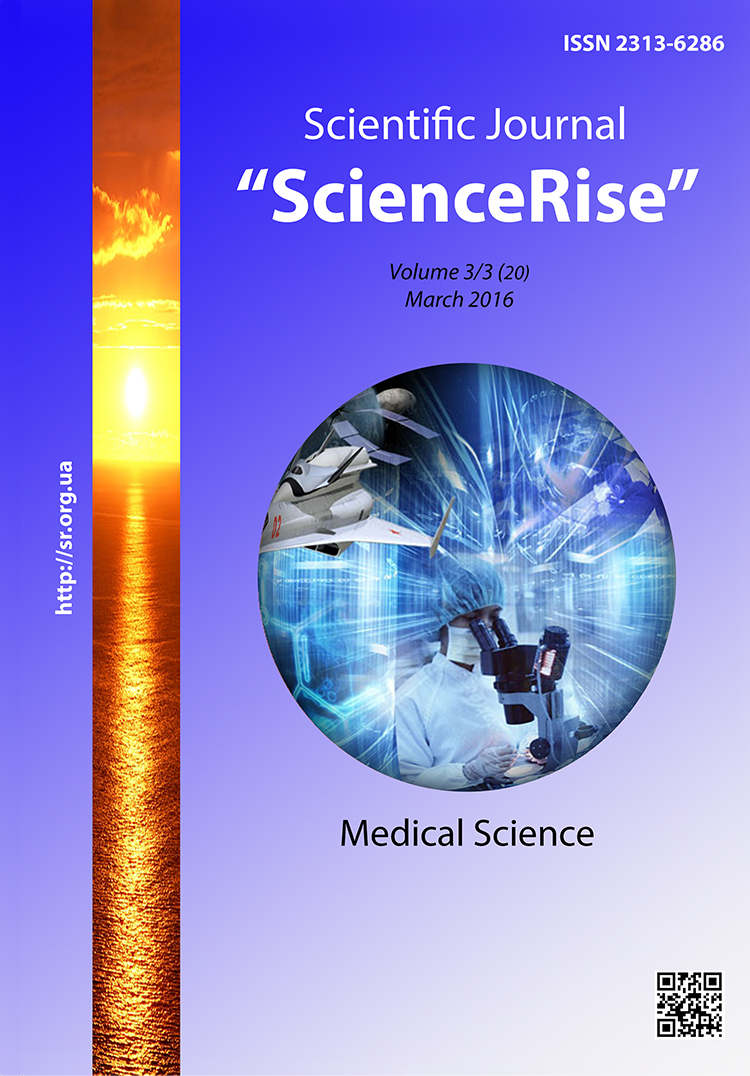The influence of reconstructive-plastic operations on the life quality of patients with breast cancer
DOI:
https://doi.org/10.15587/2313-8416.2016.65120Keywords:
life quality, breast cancer, reconstructive-plastic surgery, stage of tumor processAbstract
In the article were considered the modern state and prospects of the use of different variants of reconstructive-plastic operations in breast cancer surgery. The modern strategy of surgical treatment of breast cancer (BC) is directed on the solution of two main problems: the reliability of treatment from cancer and creation of the favorable conditions for breast reconstruction. The loss of breast is the huge psychological trauma for most patients and often compels to change the usual way of life completely.
Aim of research: Improvement of the results of complex treatment of patients with BC by the determination of indications to the use of different variants of reconstructive-plastic operations.
Materials and methods. Under observation were 120 patients with BC, who underwent combined and complex treatment in the period of 2012-2015 years on the base of MIHP “Kharkiv clinical oncological center”. For study and comparative analysis of the treatment effect on life quality (LQ) parameters all patients were divided in 2 groups by the method of temporary randomization. 1 group – 78 patients, who underwent breast reconstruction with remodeling by own tissues.
2 group – patients, who underwent hypodermic mastectomies with preservation of mammillary-alveolar complex (MAC) and with momentary breast reconstruction by the silicone endoprosthesis.
Results of research. At all stages of observation the lines of assessment of role and social functioning change in parallel that indicate the absence of the effect of the use of combined and complex treatment at the surgical stage on the given LQ parameter of patients with BC.
Conclusions. 1. On the base of research was established the absence of effect of the use of reconstructive-plastic operations in combined and complex treatment of patients with BC on the functional scales parameters. In our opinion, the decrease of qualitative values of parameters in II and III control points is connected with the effect of surgical trauma on homeostasis of patients. After disappearance of symptoms, typical for the early postoperative period, the studied LQ parameters attain the initial level (physical, social, role functioning) and even exceed it.
2. The realization of the different variants of breast reconstructions for patients with BC does not worsen the parameters of LQ symptomatic scales and general health status
References
Aseev, A. V., Vasjutkov, V. Ja. Murasheva, Je. M. et. al. (2005). Opyt izuchenija kachestva zhizni bol'nyh rakom molochnoj zhelezy. Mammologija, 3, 40–45.
Gorbunova, V. A., Breder, V. V. (2013). Kachestvo zhizni onkologicheskih bol'nyh. Voprosy onkologii, 1 (1), 34–40.
Levy, S., Haynes, L., Herberman, R. et al. (2002). Mastectomy versus breast conservation survey: Mental health effects at long-term follow-up. Health Psychol., 40, 341–351.
Bazhenova, A. P., Barvitenko, P. G. (2011). Ocenka jeffektivnosti terapii operabel'nogo raka molochnoj zhelezy. Voprosy onkologii, 24 (11), 65–70.
Aseev, A. V., Vasjutkov, V. Ja., Murasheva, Je. M. (2010). Psihologicheskie izmenenija u zhenshhin, bol'nyh rakom molochnoj zhelezy. Mammologija, 3, 14–16.
Goodyear, M. D. E., Fraumeni, M. (2006). Incorporating quality of life assessment in to clinical cancer trials. Lippincott-Raven Publishers: Philadelphia, New York, 234.
Irwing, L. (2014). Quality of life after breast cconcervation or mastectomy: a systematic review. Surg., 6, 347–351.
Lee, H. (2007). Quality of life and breast cancer survivors. Psychosocial and treatment issues. Cancer Pract., 5, 309–316.
Lindley, C., Vasa, S., Sawyer, W. et al. (1998). Quality of life and preferences for treatment following systemic adjuvant therapy for early-stage breast cancer. JCO, 16 (4), 1380–1387.
Rees, T. D., Guy, C. L., Coburn, R. J., Rees, T. D. (1973). The use of inflatable breast implants. Plastic and Reconstructive Surgery, 52 (6), 609–615. doi: 10.1097/00006534-197312000-00001
Downloads
Published
Issue
Section
License
Copyright (c) 2016 Юрий Алексеевич Винник, Светлана Александровна Фомина, Анастасия Юрьевна Гринева

This work is licensed under a Creative Commons Attribution 4.0 International License.
Our journal abides by the Creative Commons CC BY copyright rights and permissions for open access journals.
Authors, who are published in this journal, agree to the following conditions:
1. The authors reserve the right to authorship of the work and pass the first publication right of this work to the journal under the terms of a Creative Commons CC BY, which allows others to freely distribute the published research with the obligatory reference to the authors of the original work and the first publication of the work in this journal.
2. The authors have the right to conclude separate supplement agreements that relate to non-exclusive work distribution in the form in which it has been published by the journal (for example, to upload the work to the online storage of the journal or publish it as part of a monograph), provided that the reference to the first publication of the work in this journal is included.

